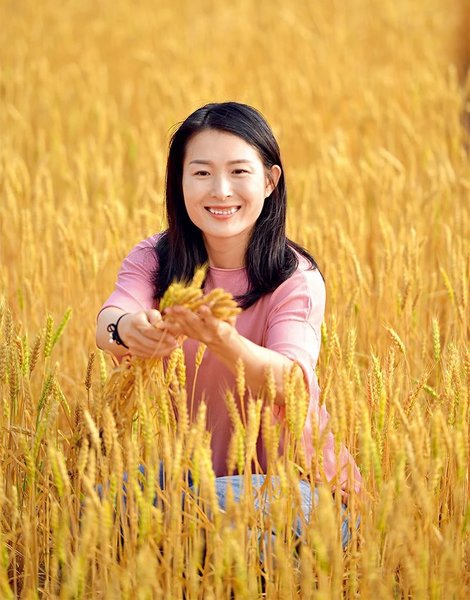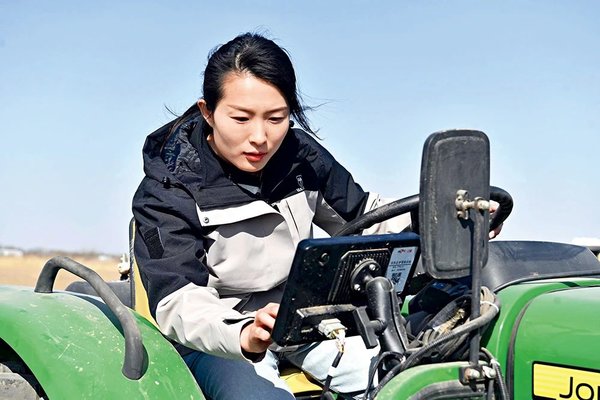Young Woman Uses Beidou System to Facilitate Farming

Zhang Chen, a "post-1990" new farmer, was born in Cangxian County, in Cangzhou, a city in north China's Hebei Province. In 2013, she returned to her hometown and joined Xinhan Planting Specialized Cooperative, founded by her father, after she graduated from Hebei Agricultural University. She worked hard to help the area's farmers improve agricultural production and increase their incomes. In recognition of her efforts, Zhang in recent years has received various awards and titles, including being named a National Rural Revitalization Youth Pioneer, a New Woman Farmer of Hebei, one of the Top 10 People in the News in Cangzhou, and an Outstanding Rural Talent in Cangzhou.
From Campus to Croplands
Zhang has always been passionate about agriculture; when she was in high school, she often borrowed agriculture-related books from the library. In 2009, she enrolled in Hebei Agricultural University, where she majored in plant protection. In 2011, she participated in a research tour of northeast China, where she learned about large-scale, mechanized farming involving rural land transfers and land trusteeship.
Zhang was impressed by how that farming model had boosted agricultural development in northeast China. Inspired, Zhang thought about developing intensive agricultural production in Cangxian. At her suggestion, her father established Xinhan Planting Specialized Cooperative. In 2013, Zhang graduated from the university and joined the cooperative, as a manager, becoming a new, full-time farmer.
Zhang's first task in managing the cooperative was to encourage farmers to transfer their land-use rights to the cooperative. Initially, only a few farmers supported the idea, and they entrusted a combined 13,000 mu (866 hectares) of land to the cooperative. Zhang then introduced two land-trusteeship plans to the farmers who were reluctant to transfer their land-use rights. The first plan involved sowing and fertilizing services on entrusted land; the second plan, sowing, fertilizing and additional services, including insecticide spraying and harvesting. At first, most of the farmers tentatively chose the first plan, and they realized higher incomes, with reasonably low investments. Eventually, they signed on to the second plan, and they entrusted more land to the cooperative.
As a result of Zhang's efforts, farmers have entrusted the cooperative with a combined 73,000 mu (4,866 hectares) of land to date, and all of that land has been used for large-scale agricultural production. This production model has saved farmers time and energy, and it has guaranteed them greater incomes.

Technology Facilitates Farming
Zhang has dreamed of using robots to improve grain production since she was a child. In 2016, she established Chenfu Family Farm, and she has since been exploring the use of modern agricultural machines.
In 2017, while attending a fair in Zhaoxian County, Shijiazhuang, in Hebei, Zhang learned about the Beidou Navigation Satellite System (BDS). When the fair concluded, she contacted a technician with Beidou.
After having gained good command of the technology, Zhang and her father decided to install BDS on their agricultural machines. Having obtained licenses to use reapers, tractors and unmanned aerial vehicles, Zhang began using these machines, equipped with BDS, in their farming operations, including seeding, weeding and harvesting. In recent years, in addition to using BDS in grain production, Zhang has worked with institutes, colleges and universities to use the system to monitor cropland conditions.
Given such efforts, automatic production has been realized on 85 percent of the land entrusted to the cooperative. Land costs have since been reduced 30-40 yuan (US $4.23-5.63) per mu, and annual yields have increased almost 10 percent per mu.
Toward Common Prosperity
If farmers are united, Zhang believes they will make grain production more efficient, and they will achieve common prosperity.
Zhang in 2018 established Hebei Pengwo Agro-food Trade Company, in Cangxian, to develop deep-processing grain businesses. She has since led the area's farmers in planting dryland wheat and coarse cereal on the region's saline-alkaline soil.
Zhang has also built two grain storage and processing centers, and five green-food production lines, which are capable of processing a combined 1.5 million tons of grain and mixed beans annually. She has also developed several food brands, which are now sold in more than 50 cities across China. Zhang's agricultural industry chain has helped 206 rural households escape poverty.
Since 2020, Zhang has regularly attended training courses for principal leaders from high-quality farmers' cooperatives in Hebei. She has shared what she has learned during those courses with other farmers. She has also helped farmers in neighboring counties improve the efficiency of their operations.
When asked about the future, Zhang says, "I will encourage more young people to devote themselves to agricultural development, to make our younger generations' contributions to rural revitalization."
Photos from Interviewee
(Women of China English Monthly October 2024)
Editor: Wang Shasha
Please understand that womenofchina.cn,a non-profit, information-communication website, cannot reach every writer before using articles and images. For copyright issues, please contact us by emailing: website@womenofchina.cn. The articles published and opinions expressed on this website represent the opinions of writers and are not necessarily shared by womenofchina.cn.








.jpg)

 WeChat
WeChat Weibo
Weibo 京公网安备 11010102004314号
京公网安备 11010102004314号